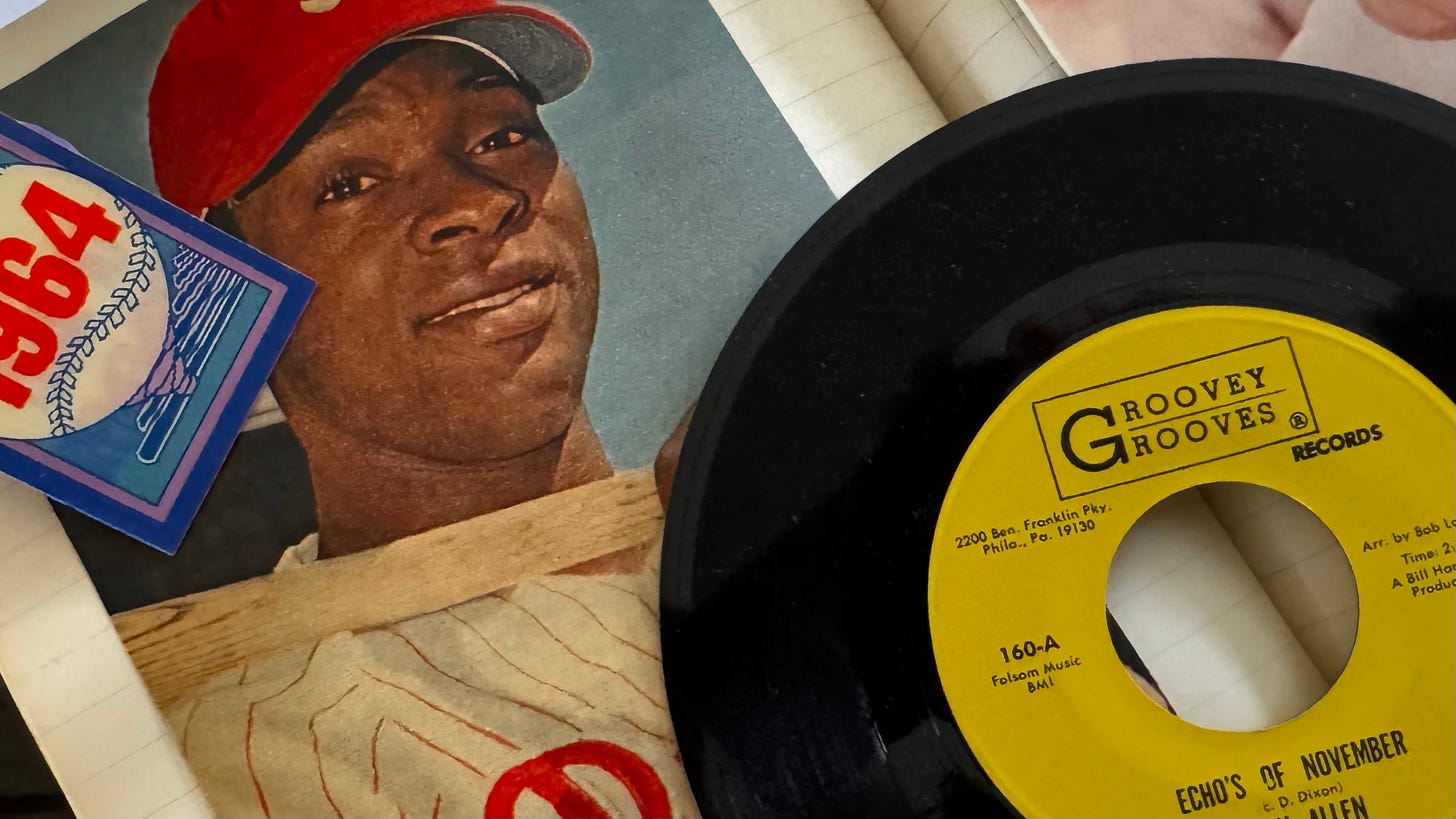Dick Allen--Baseball Hall of Famer; Moonlight Tenor
The temperamental slugger enters Cooperstown the summer. Here's hoping they mention his doo wop band--the Ebonistics--on the plaque.
In 1964, Dick Allen was the best hitter on a team destined for infamy. The young 3rd baseman slugged 29 home runs, hit .318, and landed Rookie of the Year honors while leading the Phillies to the brink of their first pennant in 14 years.
The Phold
With 12 games to go and a 6 ½ game lead, the Phillies were in bunting distance of a World Series. Then they dropped 10 straight. After spending every single day of the season in first place, the Phillies surrendered the top spot to the St. Louis Cardinals with two days to go. It was the greatest collapse baseball had seen to that date.
It was also the beginning of a tumultuous relationship between Allen, the fans, and his teammates. The Phillies had a particularly bad reputation on the issue of race, with fans and players alike guilty of some of the most egregious taunts and epithets faced by a visiting Jackie Robinson in 1947. As an organization, they were the final National League team to integrate in 1957.
Against that backdrop, Allen became the team’s first black star–a player with a big bat and a big personality. But he also had a reputation for difficulty–some of it a consequence of the racial hostility he faced in his journey through the majors; some of it a consequence of his own cantankerous disposition.
So as the Phillies faced diminishing returns in the standings over the next four seasons, Allen bore the brunt of the public blame. Though he continued to hit mightily, his standoffish relationship with spectators, the press, his teammates, and a series of frustrated managers made him an obvious target for fan frustration.
Boo Wop
In a city where booing is second nature, Dick Allen stood out for what he endured. But, the powerful hitter was also the owner of a lovely tenor.
So in 1968–a year in which the Phillies finished 76-86, 21 games out of first place; a year in which he smashed 33 home runs while publicly demanding to be traded–Allen did the only logical thing for a man in his position.
He formed a Doo Wop group called the Ebonistics and pressed a single called “Echoes of November”. It was a minor regional hit—sung, perhaps, from the perspective of a man who longed for the end of an interminable summer season.
It was the very first release for a record label located on the Ben Franklin Parkway called Groovey Grooves. The single above, and the B-Side below, form the whole of Dick Allen’s discography.
There wasn’t a whole lot more from Groovey Grooves either. The label released just a little over a dozen 45s–all highly collectible Northern Soul nuggets today–before disappearing in the early ‘70s.
At the time of their lone release, the Ebonistics actually performed the song live during a somewhat high profile appearance–-halftime at a 76ers game.
An article from the Philadelphia Inquirer reported on the unlikely moment:
Here came Rich Allen. Flowered shirt. Tie six-inches wide. Hiphugger bell-bottomed pants. A microphone in his hands. Rich Allen the most booed man in Philadelphia from April to October, when Eagles coach Joe Kuharich takes over, walked out in front of 9,557 people at the Spectrum last night to sing with his group, The Ebonistics, and a most predictable thing happened. He was booed. Two songs later though, a most unpredictable thing happened. They cheered Rich Allen. They cheered him as warmly as they have ever cheered him for a game winning home run.
It was also probably the final high point for Allen during his first stint Philadelphia. Things unraveled dramatically during the following season. The disgruntled star was habitually late for team meetings, faced repeated fines, and even went AWOL for a bizarre stretch of 26 days that summer. So infuriating were his antics that manager Bob Skinner resigned in August–explicitly citing Allen as a reason.
Finally, after the Phillies sputtered to a dreadful 63-99 record, they shipped Allen to St. Louis as part of a package deal.
Allen would also spend time with the Dodgers and White Sox before returning to Philly under more amicable terms for the 1975-76 season. He played just a few more games for the Oakland Athletics before retiring in 1977.
Allen passed away in 2020, at age 78, the same year the Phillies retired his #15. He will be enshrined in the Hall of Fame this summer, leaving behind a resume of 351 home runs, a career batting average of .292, 7 All-Star Game appearances, and one tender slab of soul wax.




